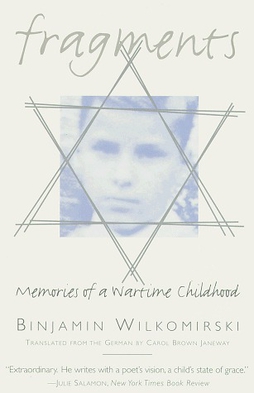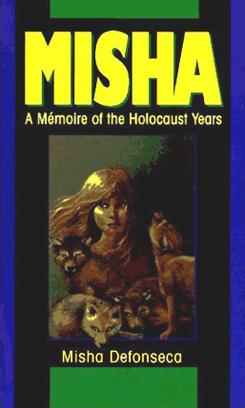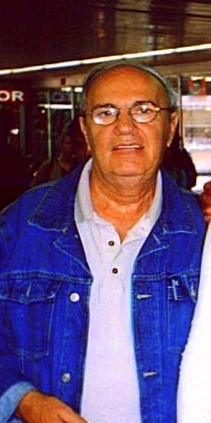Fred Arthur Leuchter Jr. is an American manufacturer of execution equipment and Holocaust denier, best known as the author of the Leuchter report, a pseudoscientific document alleging there were no gas chambers at Auschwitz-Birkenau. Prior to the document's publication, he was contracted by authorities of several U.S. states to improve the designs of instruments for capital punishment. He was charged in Massachusetts with misrepresenting himself to penitentiaries as an engineer, despite having no relevant qualifications. He plea bargained with state prosecutors and received two years' probation. He has also been accused of running a "death row shakedown", where he threatened to testify for the defense in capital cases if he was not given contracts for his services by that state.

Fragments: Memories of a Wartime Childhood is a 1995 book, whose author used the pseudonym Binjamin Wilkomirski, which purports to be a memoir of the Holocaust. It was debunked by Swiss journalist and writer Daniel Ganzfried in August 1998. The subsequent disclosure of Wilkomirski's fabrications sparked heated debate in the German- and English-speaking world. Many critics argued that Fragments no longer had any literary value. Swiss historian and anti-Semitism expert Stefan Maechler later wrote, "Once the professed interrelationship between the first-person narrator, the death-camp story he narrates, and historical reality are proved palpably false, what was a masterpiece becomes kitsch."

Quackwatch is a United States-based website, self-described as a "network of people" founded by Stephen Barrett, which aims to "combat health-related frauds, myths, fads, fallacies, and misconduct" and to focus on "quackery-related information that is difficult or impossible to get elsewhere". Since 1996 it has operated the alternative medicine watchdog website quackwatch.org, which advises the public on unproven or ineffective alternative medical remedies. The site contains articles and other information criticizing many forms of alternative medicine.

Enric Marco was a Catalonian impostor who claimed to have been a prisoner in Nazi German concentration camps Mauthausen and Flossenbürg in World War II. He was awarded the Creu de Sant Jordi by the Catalan government in 2001 and wrote a book on his experiences. In 2005 he admitted his claims were false and returned his medal, after his deception was revealed by university researcher Benito Bermejo.
The Japanese Paleolithic hoax consisted of a number of lower and middle paleolithic finds in Japan discovered by amateur archaeologist Shinichi Fujimura, which were later all discovered to have been faked. The incident became one of the biggest scandals in archaeological circles in Japan after the story was published by the Mainichi Shimbun on November 5, 2000.

Misery porn is a literary genre dwelling on trauma, mental and physical abuse, destitution, or other enervating trials suffered by the protagonists or, allegedly, the writer. While in a broad sense the genre is as at least as old as mass-market fiction, the terms misery lit and misery porn are usually applied pejoratively to steamy potboilers, schlock horror, and lurid autobiographical wallows of dubious authenticity, especially those without a happy ending.
Alex (Uldis) Kurzem is an Australian pensioner originally from Eastern Europe, living in Melbourne; a centre-point of a long-standing controversy regarding his Holocaust memoir which has led to a financial windfall in the early 21st century. He was the subject of a TV documentary and a best-selling book by his son, translated into 13 languages; both entitled The Mascot.

Misha: A Mémoire of the Holocaust Years is a literary hoax by Misha Defonseca, first published in 1997. The book was fraudulently published as a memoir telling the supposed true story of how the author survived the Holocaust as a young Jewish girl, wandering Europe searching for her deported parents. The book sold well in several countries and was made into a film, Survivre avec les loups, named after the claim that Misha was adopted by a pack of wolves during her journey who protected her.
Misha Defonseca is a Belgian-born impostor and the author of a fraudulent Holocaust memoir titled Misha: A Mémoire of the Holocaust Years, first published in 1997 and at that time professed to be a true memoir. It became an instant success in Europe and was translated into 18 languages. The French version of the book was a derivative work based on the original with the title Survivre avec les loups that was published in 1997 by the Éditions Robert Laffont; this second version was adapted into the French film of the same name.
Fake memoirs form a category of literary forgery in which a wholly or partially fabricated autobiography, memoir or journal of an individual is presented as fact. In some cases, the purported author of the work is also a fabrication.

Angel at the Fence: The True Story of a Love That Survived, written by Herman Rosenblat, was a fictitious Holocaust memoir purporting to tell the true story of the author's reunion with, and marriage to, a girl who had passed him food through the barbed-wire fence when he was imprisoned at the Schlieben subcamp of the Buchenwald concentration camp in World War II. The book was scheduled for publication by Berkley Books in February 2009, but its publication was canceled on December 27, 2008, when it was discovered that the book's central events were untrue.

Herman A. Rosenblat was a Polish-born American author, known for writing a fictitious Holocaust memoir titled Angel at the Fence, purporting to tell the true story of a girl who passed him food through the barbed-wire fence at the Schlieben sub-camp of the Buchenwald concentration camp in World War II. The book was planned to be published in 2009 by Berkley Books, but was cancelled after it turned out that many elements of his memoir were fabricated and some were contrary to verifiable historical facts. Rosenblat later admitted to lying on purpose with the intention of bringing joy.
Kenneth Alan "Kenny" Waltzer is an American historian and educator, formerly director of the Jewish Studies program at Michigan State University (MSU). His research on the Buchenwald concentration camp has focused on the rescue of children and youths inside the camp and has included some notable findings.
Colleen M. Fitzpatrick is an American forensic scientist, genealogist and entrepreneur. She helped identify remains found in the crash site of Northwest Flight 4422, that crashed in Alaska in 1948, and co-founded the DNA Doe Project which identifies previously unidentified bodies and runs Identifinders International, an investigative genetic genealogy consulting firm which helps identify victims and perpetrators of violent crimes.
Debórah Dwork is an American historian, specializing in the history of the Holocaust. She is the Founding Director of the Strassler Center for Holocaust and Genocide Studies and formerly served as the Rose Professor of Holocaust History at Clark University in Worcester, Massachusetts.
Rosemarie Pence is a German-American woman who posed as a child Holocaust survivor from the Dachau Concentration Camp. Pence became the subject of a fake biography titled Hannah: From Dachau to the Olympics and Beyond published in 2005. Her fabrications, which included a fake Jewish background, were discovered in 2009. By 2012 she was wanted in Colorado's Boulder County on an arrest warrant for check fraud and the theft of more than $20,000.
Donald Joseph Watt was an Australian Army soldier and the author of a literary hoax, a fictitious Holocaust memoir entitled Stoker: The Story of an Australian Soldier who Survived Auschwitz-Birkenau, published in 1995 by Simon & Schuster. Only the disclosure of Watt's fabrications altered the status of the book which was initially praised by various Jewish organizations as the most important work written in Australia.

Hannah: From Dachau to the Olympics and Beyond is a Holocaust biography written by Jean Goodwin Messinger about Hannah Pence. The book gained notoriety when it was revealed that the entire story had been fabricated by Pence.

Misha and the Wolves is a 2021 documentary film written and directed by Sam Hobkinson. The film examines the fraudulent 1997 Holocaust memoir of Misha Defonseca.








